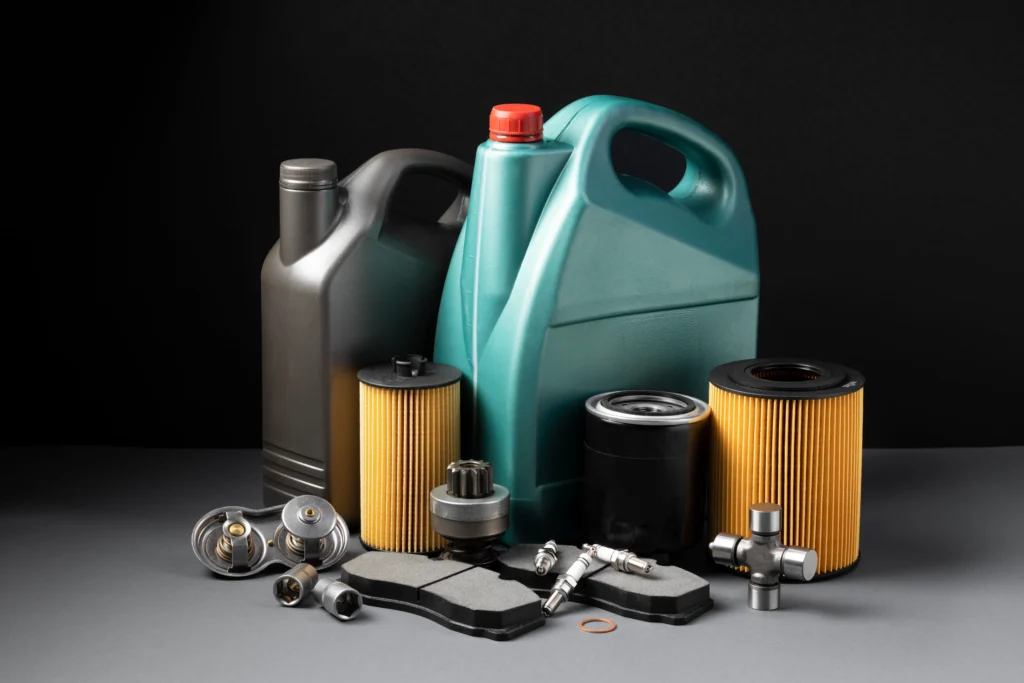How Oil Filters Work: A Guide to Engine Efficiency

The oil filter is one of the most essential parts that affects engine performance. It is the first line of protection against tiny particles that could harm your engine. However, have you ever pondered the contents and operation of an oil filter? The materials and construction of the various essential parts that make up an oil filter determine its performance. In this blog, we’ll explain the operation of oil filters, their significance, and how to keep them in good condition.
What Is an Oil Filter?
An engine lubrication system contains a relatively small but essential component: an oil filter. One of the most critical functions of the oil filter is cleaning the engine oil as it travels through the various components of the automotive engine. Clean oil guarantees smooth and effective operation, lowers wear and tear and prevents the building of dangerous deposits, which is why this process is vital.
Dust, metal shavings, and combustion byproducts are just some of the impurities an efficient oil filter can capture before entering the engine chamber. If the engine does not have a functional oil filter, contaminants could damage the engine’s moving elements, resulting in expensive repairs or even its full failure.
How Does an Oil Filter Work?
When motor oil is not in use, it either remains in the oil pan or takes a brief rest period. An oil pump draws the motor oil up and passes it through the oil filter before it returns to the engine. The filter removes contaminants like dirt, sludge, and oversized particles from the motor oil as it passes through pleated folds, or media, before returning to the engine.
Oil filters, like engine oil, have a limited filter life. Eventually, the filter will get so clogged with particles that it can no longer capture them, and pressure will rise. The pressure increases the bypass valve inside the filter to prevent oil starvation in the engine and allow oil to continue flowing and circulating in the engine unfiltered. Replace the oil filter and change the oil regularly to maintain optimal engine performance.
The design, caliber of the filtration material, and engine compatibility all affect its effectiveness. Therefore, it is important to select the appropriate oil filter carefully, as manufacturers design modern oil filters to fit specific types.
Maintenance Tips for Oil Filters
Engine oil filter removes impurities from the oil before distributing it throughout the engine’s cylinders. You should perform regular maintenance on the oil filter. Before the oil reaches the engine, the oil filter is in charge of eliminating any impurities that may be present in the refined oil. Improved performance, increased fuel efficiency, and extended life span for your engine are all possible outcomes of routine maintenance on your oil filter. In this section, we will go over some helpful hints and suggestions for extending the lifespan of your machine.
Procedures outlined by the Manufacturer:
It is always recommended that you should replace your oil filter according to the owner’s handbook. According to most rules, the filter should be changed after each oil change.
Utilize Filters of a High-Quality:
Put your money into a high-quality oil filter compatible with your engine to ensure it will last as long as possible and perform at its best.
Oil Filter Lifespan Impact
It is impossible to determine how long an oil filter is expected to last. Many aspects, including the type of engine and the environment in which the vehicle operates, determine its lifespan.
Monitor oil levels and quality:
Check the condition of your oil and the amount of oil it contains regularly. Dirty or low oil can reduce the filter’s performance and damage your engine.
Check While the Oil Is Being Changed
During each oil change, the old filter should be inspected for debris or damage. This can provide information about the condition of your engine.
Conclusion
Although the oil filter is a relatively minor component, which plays a significant role in ensuring that the engine is efficient and long-lasting. If you understand how oil filters function and manage them properly, you can keep your engine running smoothly, prevent wear, and avoid costly repairs. It is important to prioritize routine maintenance and components of good quality if you want to have a car that functions properly for many years to come.

